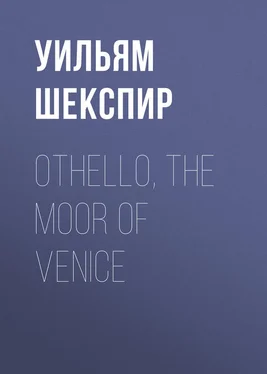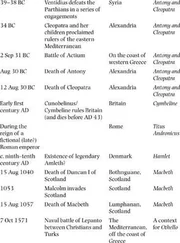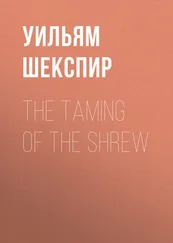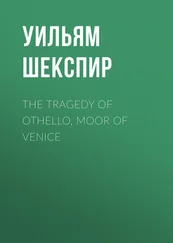Уильям Шекспир - Othello, the Moor of Venice
Здесь есть возможность читать онлайн «Уильям Шекспир - Othello, the Moor of Venice» — ознакомительный отрывок электронной книги совершенно бесплатно, а после прочтения отрывка купить полную версию. В некоторых случаях можно слушать аудио, скачать через торрент в формате fb2 и присутствует краткое содержание. Жанр: Европейская старинная литература, Драматургия, foreign_dramaturgy, на английском языке. Описание произведения, (предисловие) а так же отзывы посетителей доступны на портале библиотеки ЛибКат.
- Название:Othello, the Moor of Venice
- Автор:
- Жанр:
- Год:неизвестен
- ISBN:нет данных
- Рейтинг книги:3 / 5. Голосов: 1
-
Избранное:Добавить в избранное
- Отзывы:
-
Ваша оценка:
- 60
- 1
- 2
- 3
- 4
- 5
Othello, the Moor of Venice: краткое содержание, описание и аннотация
Предлагаем к чтению аннотацию, описание, краткое содержание или предисловие (зависит от того, что написал сам автор книги «Othello, the Moor of Venice»). Если вы не нашли необходимую информацию о книге — напишите в комментариях, мы постараемся отыскать её.
Othello, the Moor of Venice — читать онлайн ознакомительный отрывок
Ниже представлен текст книги, разбитый по страницам. Система сохранения места последней прочитанной страницы, позволяет с удобством читать онлайн бесплатно книгу «Othello, the Moor of Venice», без необходимости каждый раз заново искать на чём Вы остановились. Поставьте закладку, и сможете в любой момент перейти на страницу, на которой закончили чтение.
Интервал:
Закладка:
William Shakespeare
Othello, the Moor of Venice
Persons Represented
DUKE OF VENICE
BRABANTIO, a Senator
Other Senators
GRATIANO, Brother to Brabantio
LODOVICO, Kinsman to Brabantio
OTHELLO, a noble Moor, in the service of Venice
CASSIO, his Lieutenant
IAGO, his Ancient
MONTANO, Othello's predecessor in the government of Cyprus
RODERIGO, a Venetian Gentleman
CLOWN, Servant to Othello
Herald
DESDEMONA, Daughter to Brabantio and Wife to Othello
EMILIA, Wife to Iago
BIANCA, Mistress to Cassio
Officers, Gentlemen, Messenger, Musicians, Herald, Sailor, Attendants, &c.
ACT I
SCENE I. Venice. A street
[Enter Roderigo and Iago.]
RODERIGO
Tush, never tell me; I take it much unkindly
That thou, Iago, who hast had my purse
As if the strings were thine, shouldst know of this, —
IAGO
'Sblood, but you will not hear me: —
If ever I did dream of such a matter,
Abhor me.
RODERIGO
Thou told'st me thou didst hold him in thy hate.
IAGO
Despise me, if I do not. Three great ones of the city,
In personal suit to make me his lieutenant,
Off-capp'd to him: – and, by the faith of man,
I know my price, I am worth no worse a place: —
But he, as loving his own pride and purposes,
Evades them, with a bumbast circumstance
Horribly stuff'd with epithets of war:
And, in conclusion, nonsuits
My mediators: for, "Certes," says he,
"I have already chose my officer."
And what was he?
Forsooth, a great arithmetician,
One Michael Cassio, a Florentine,
A fellow almost damn'd in a fair wife;
That never set a squadron in the field,
Nor the division of a battle knows
More than a spinster; unless the bookish theoric,
Wherein the toged consuls can propose
As masterly as he: mere prattle, without practice,
Is all his soldiership. But he, sir, had the election:
And I, – of whom his eyes had seen the proof
At Rhodes, at Cyprus, and on other grounds,
Christian and heathen, – must be belee'd and calm'd
By debitor and creditor, this counter-caster;
He, in good time, must his lieutenant be,
And I – God bless the mark! his Moorship's ancient.
RODERIGO
By heaven, I rather would have been his hangman.
IAGO
Why, there's no remedy; 'tis the curse of service,
Preferment goes by letter and affection,
And not by old gradation, where each second
Stood heir to the first. Now, sir, be judge yourself
Whether I in any just term am affin'd
To love the Moor.
RODERIGO
I would not follow him, then.
IAGO
O, sir, content you;
I follow him to serve my turn upon him:
We cannot all be masters, nor all masters
Cannot be truly follow'd. You shall mark
Many a duteous and knee-crooking knave
That, doting on his own obsequious bondage,
Wears out his time, much like his master's ass,
For nought but provender; and when he's old, cashier'd:
Whip me such honest knaves. Others there are
Who, trimm'd in forms and visages of duty,
Keep yet their hearts attending on themselves;
And, throwing but shows of service on their lords,
Do well thrive by them, and when they have lin'd their coats,
Do themselves homage: these fellows have some soul;
And such a one do I profess myself. For, sir,
It is as sure as you are Roderigo,
Were I the Moor, I would not be Iago:
In following him, I follow but myself;
Heaven is my judge, not I for love and duty,
But seeming so for my peculiar end:
For when my outward action doth demónstrate
The native act and figure of my heart
In complement extern, 'tis not long after
But I will wear my heart upon my sleeve
For daws to peck at: I am not what I am.
RODERIGO
What a full fortune does the thick lips owe,
If he can carry't thus!
IAGO
Call up her father,
Rouse him: – make after him, poison his delight,
Proclaim him in the streets; incense her kinsmen,
And, though he in a fertile climate dwell,
Plague him with flies: though that his joy be joy,
Yet throw such changes of vexation on't
As it may lose some color.
RODERIGO
Here is her father's house: I'll call aloud.
IAGO
Do; with like timorous accent and dire yell
As when, by night and negligence, the fire
Is spied in populous cities.
RODERIGO
What, ho, Brabantio! Signior Brabantio, ho!
IAGO
Awake! what, ho, Brabantio! thieves! thieves! thieves!
Look to your house, your daughter, and your bags!
Thieves! thieves!
[Brabantio appears above at a window.]
BRABANTIO
What is the reason of this terrible summons?
What is the matter there?
RODERIGO
Signior, is all your family within?
IAGO
Are your doors locked?
BRABANTIO
Why, wherefore ask you this?
IAGO
Zounds, sir, you're robb'd; for shame, put on your gown;
Your heart is burst, you have lost half your soul;
Even now, now, very now, an old black ram
Is tupping your white ewe. Arise, arise;
Awake the snorting citizens with the bell,
Or else the devil will make a grandsire of you:
Arise, I say.
BRABANTIO
What, have you lost your wits?
RODERIGO
Most reverend signior, do you know my voice?
BRABANTIO
Not I; what are you?
RODERIGO
My name is Roderigo.
BRABANTIO
The worser welcome:
I have charged thee not to haunt about my doors;
In honest plainness thou hast heard me say
My daughter is not for thee; and now, in madness,
Being full of supper and distempering draughts,
Upon malicious bravery dost thou come
To start my quiet.
RODERIGO
Sir, sir, sir, —
BRABANTIO
But thou must needs be sure
My spirit and my place have in them power
To make this bitter to thee.
RODERIGO
Patience, good sir.
BRABANTIO
What tell'st thou me of robbing? this is Venice;
My house is not a grange.
RODERIGO
Most grave Brabantio,
In simple and pure soul I come to you.
IAGO
Zounds, sir, you are one of those that will not serve God if the devil bid you. Because we come to do you service, and you think we are ruffians, you'll have your daughter covered with a Barbary horse; you'll have your nephews neigh to you; you'll have coursers for cousins and gennets for germans.
BRABANTIO
What profane wretch art thou?
IAGO
I am one, sir, that comes to tell you your daughter and the Moor are now making the beast with two backs.
Читать дальшеИнтервал:
Закладка:
Похожие книги на «Othello, the Moor of Venice»
Представляем Вашему вниманию похожие книги на «Othello, the Moor of Venice» списком для выбора. Мы отобрали схожую по названию и смыслу литературу в надежде предоставить читателям больше вариантов отыскать новые, интересные, ещё непрочитанные произведения.
Обсуждение, отзывы о книге «Othello, the Moor of Venice» и просто собственные мнения читателей. Оставьте ваши комментарии, напишите, что Вы думаете о произведении, его смысле или главных героях. Укажите что конкретно понравилось, а что нет, и почему Вы так считаете.












